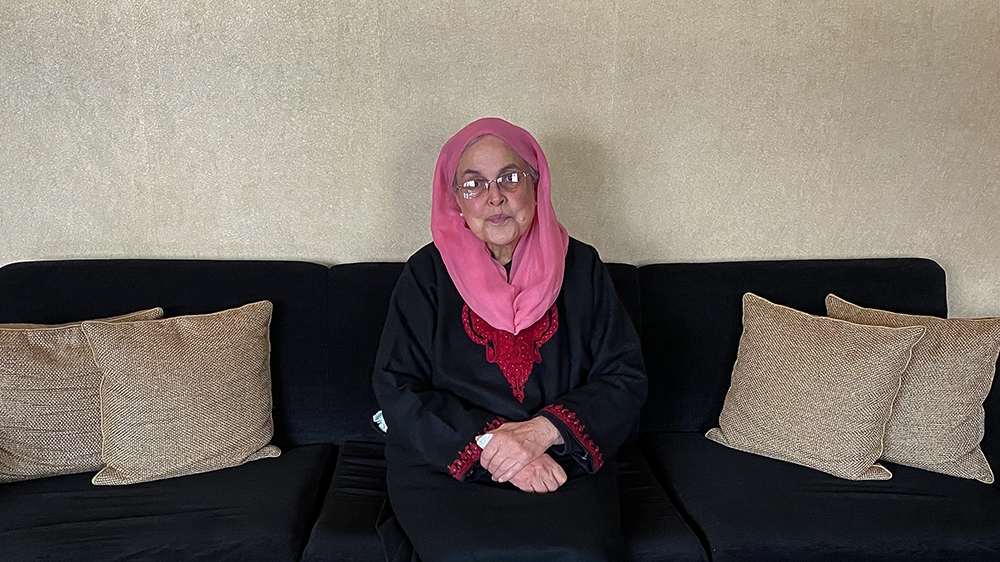Daughter of Sheikh Abdullah, whose family ruled Kashmir for decades, accuses India of erasing her father’s legacy.
Srinagar, Indian-administered Kashmir – Khalida Shah speaks poignantly about her late father Sheikh Muhammad Abdullah, the most influential leader of modern Kashmir, whose disputed legacy makes him a hero to some and a villain to others.
For decades, Sheikh Abdullah’s birthday on December 5 was a state holiday in Indian-administered Kashmir. But it has now been erased from the calendar by New Delhi, which stripped the Muslim-majority region of its limited autonomy six months ago.
“It is definitely hurtful,” Shah, 84, told Al Jazeera at her home in the main city of Srinagar, where she has been under house arrest since August last year as part of a government crackdown against Kashmiri politicians.
Her brother Farooq Abdullah and nephew Omar Abdullah, both former chief ministers, have been in detention since August.

“Indian government is trying to erase the history of Kashmir by doing this,” she said referring to the removal of Abdullah’s anniversary celebration by India’s governing Hindu nationalist Bharatiya Janata Party (BJP).
On August 5 last year, Prime Minister Narendra Modi, who had campaigned against special status for Kashmir, decided to abrogate Articles 370 and 35A of the constitution, the constitutional provisions secured by Abdullah 70 years ago.
Article 370 allowed Kashmir to have its own flag, a separate constitution and the freedom to make laws.
Changing demographics and erasing history
Kashmiri activists fear the removal of the special status will likely open the door for demographic changes in the Muslim-majority region, as outsiders can now buy land and settle in the Himalayan region.
Many were also angered by the Modi government’s decision to cancel the Martyrs Day holiday observed on July 13 in remembrance of 22 people killed during protests against Kashmir’s Hindu monarch in 1931.
Angry at India’s recent actions in Kashmir, Shah said her family “became enemies with people for siding with India”. Three generations of the Abdullah family ruled the region for most of the last seven decades.
Sheikh Abdullah’s rise began in 1931 when he led the people of Kashmir in resistance of the Dogra monarch at the time, Hari Singh, making him an instant hero.
The Kashmir leader, who fought for self-rule, later backed Hari Singh’s decision to join the Indian union on the condition a plebiscite would decide the future of the Muslim-majority region.
While Abdullah had been close to India’s powerful political leaders, including its first prime minister, Jawaharlal Nehru, he remained an ardent critic of Pakistan’s founder Muhammad Ali Jinnah.
In the years after his death in 1982, as armed rebellion against Indian rule started to take roots and pro-Pakistan voices became emboldened, many considered him a villainous figure and saw his politics as a betrayal of the Kashmiri cause.
Erasing the Kashmiri people’s history
India and Pakistan, who claim Kashmir in full but govern only parts of it, gained independence from British rule in August 1947.
Hari Singh signed the Instrument of Accession, by which he agreed that the princely state of Jammu and Kashmir would accede to the Indian Union, in October 1947. Under the Instrument, New Delhi only controlled the region’s foreign affairs, defence and communications. Over time, however, New Delhi diluted Kashmir’s autonomous status.
Experts say the Indian government is working to impose their version of history in Kashmir.
The government has declared October 26 as Accession Day to commemorate the signing of the Instrument in 1947.
“Hindu right-wing in India lays territorial claims on Kashmir by systematically erasing historical experiences of Kashmiri people,” Muhammad Junaid, a Kashmiri academic based in the US, told Al Jazeera.
“They want to deny the existence of long history of Kashmiri struggle against the Hindu Dogra feudal state as well as [for] freedom from Indian control,” he said.
He also said the events that reaffirm the existence of Kashmiris and their struggles for emancipation are seen as “affronts to Hindu nationalism” by New Delhi.
“They want to forcibly suppress people’s memories, especially those that hold the centre of Kashmiri identity and impose their own version,” Junaid told Al Jazeera.
BJP defends Kashmir move
But Ashok Koul, chief spokesman of the BJP in Jammu and Kashmir, defended the Modi government’s Kashmir move, insisting these steps “won’t harm anyone”.
“History should be put in the right perspective for the new generations. The government knows what are the right things for this society,” he said referring to the abrogation of Article 370.
Shah, the daughter of Sheikh Abdullah, termed the events in 1931 as “the base of Kashmir’s struggle”.
“The flag of Kashmir, which no more exists, is the sign of their blood, [those] who were killed on that day on July 13.”
Idris Kant, a Kashmiri historian, said July 13 has an immense “symbolic value” to it, reminding Kashmiris that they continue to be “occupied people”.
On January 26, celebrated as Republic Day, authorities in Kashmir announced a change in the language on police medal for meritorious service, removing the words “Sher-e-Kashmir” or “Lion of Kashmir” – a reference to Sheikh Abdullah – from it.
“I want to tell India they cannot erase the legacy of my father from Kashmir as everyone remembers him here,” she said. “History can never be erased.”
